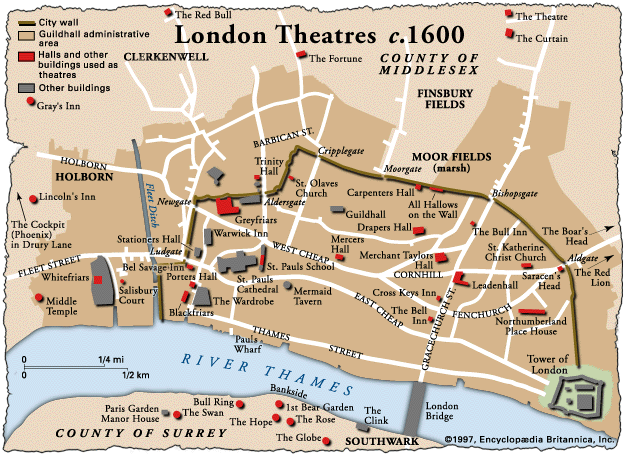
Map of London Theatres during Shakespeare's time
Hamlet
Before we start, any general questions on Shakespeare?
Write time and date on board: It's a Saturday, noon, 1600, London.
You're a swineherd. You've travelled in from the country, sold off some swine and you've got money in your pocket and some time to kill. You, like many other lower-middle class Englishman, had developed a taste for the playwatching. So, you head off to new theater (1599). The Globe, that opened up last year to see the show that's been knocking them dead: Shakespeare's Hamlet. A couple of years earlier, you'd seen a revival of Thomas Kyd's Hamlet and you'd enjoyed the ghost scenes, the way Hamlet acted insane -- and the fight scenes. You were especially satisfied in the end when Claudis gets stabbed: you were right in the front for that scene and got some of the blood on you.
You head out of the marketplace and cross the Thames over London Bridge to a suburb of London -- Southwark or the "Liberties" because it was beyond the range of city authorities -- a place where all the public theaters are because the church and the government views acting as suspect (and also where the criminals, hospitals, lepers, brothels, were).

Map of London Theatres during Shakespeare's time
Most of the images for this section were taken from the Encyclopedia Britannitca's Shakespeare site, which was (note past tense) a lively and informative introduction to Shakespeare
On the way to the liberties, you notice various royal proclamations (printed up on Broadsides) against the dangers of play-acting, tacked up to the bridge across the Thames.
1 that it attracts the rabble (excluding you, of course), and you know they're mainly worried about a bunch of working-class folks getting together and complaining about the Queen,
2 that it fosters disease (You did get a nasty rash last time you were in town -- and the one time the plague flared up, all the theaters were closed)
3 and most importantly, that it encourages lying (the actors act like people you know they cannot be) -- commoners even become Kings and Queens!
But you're a loyal subject: you've sworn your allegiance to Queen Elizabeth (though she's getting kinda old), and you fully realize that everything revolves around the Court (or royalty). You even see the irony of the play being titled Hamlet: the focus for you is on Prince Hamlet and you feel sorry for him, but you realize that for the characters in the play, the focus is on the King and Queen.
The play doesn't start until 2:00, so you mosey over to the Bear Garden to catch some bear-baiting (nothing like seeing a pack of dogs rip into a bear to get your blood up). After a bit you get bored (if you've seen one angry, bloodied bear, you've seen them all), you head just down the street to the Globe.
You're pretty impressed by the architecture and the size -- a round building, it holds about 2,000 people
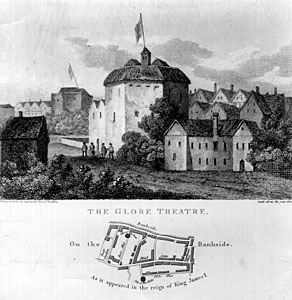 |
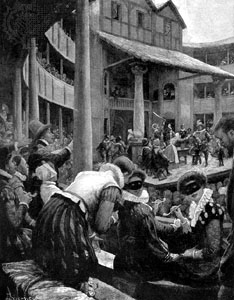 |
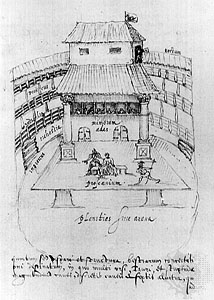 |
| Globe Theatre: copy of 1612 engraving | Old Globe in Shakespeare's day: Drawing circa. 1910 | Swan's Theatre, c. 1596. The Globe supposedly replicated this interior structure. |
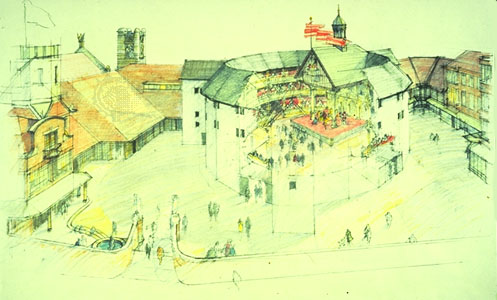
Refurbished Globe
You fish out your penny (average daily wage of an unskilled worker, 5-6 pence) to pay for
the open admission -- you don't mind standing for the duration being a
"groundling." You go inside and you notice that, as in other theaters, there is
a "Thrust" stage (Draw on the board) with its canvas covering and
balcony at the rear (You remember that four years ago, in the old playhouse called
"The Theater," the boy who had played Juliet were in town had almost fallen off
a similar balcony. You hoped the company had found a new boy to play the female parts
because that one had been a clumsy oaf with a squeaky voice). As usual, the stage is bare
stage, with just a door to exit and enter and what looks like a trap door in the middle of
the stage.
Quite a crowd was there: You saw the usual: a few prostitutes and pickpockets working the crowd, the upper crust in the galleries surrounding the stage, and the vendors selling nuts.
You're looking forward to seeing Hamlet because you already know the basics:
write on board
Revenge tragedy:
1 Ghost who calls for revenge
2 Revenger pretends to be insane
3 Revenger needs to die
So you can pay more attention to the words and not worry about the plot. Still, you're a discriminating pig farmer, and you've heard from a fellow swineherd that Shakespeare takes this basic form -- which has been around for quite a while -- and adds:
1. personal complexity (earlier versions reveled in the gore and
violence),
2. scope: dealing with issues of political power, relationship b/t men and women,
rationality vs. revenge, christianity vs. revenge, the relationships b/t the real and the
not real.
Somebody tells everyone to be quiet, and an actor strides out on the stage. You can tell he's supposed to be a soldier because he's wearing a helmet and carrying a spear, but you don't know yet when the play is set:
Read lines 1-10: explain how it sets up the basics of the play.
Then you just relax and enjoy the first act -- which sets up the whole play for you.
______________________________
Now, unlike the swineherd, you've got me around to bore you with important details like the themes in the play.
Basic Movement of Play
Act I: mysteriousness:
Act II & III: appearance v. reality
Act IV & V: Mortality
_______________________________
Tragic Hero: complex Goes back to Aristotle who said that the problem with a tragic hero needs to be innate -- part of the characters personality. Hamlet himself offers a definition of a tragic figure (cf. I, iv, 25) Thus, the tragic hero is imperfect. What's Hamlet's flaw?
Tragic dilemma: you have to make one of two equally difficult choices (rock and a hard place)
"Reversal" in tragedy: When good goes bad
Themes
Irony
Response to Evil
Reason vs. Action?
For your journals, continue to pick out an interesting quote:
General Notes on Shakespeare
Born 1564 died April 23, 1616 -- death often noted as the end of the European Renaissance
37 plays
QUESTIONS
Act I -- Exposition (what's that mean again?): Introduces major characters, the situation, and the conflict
More importantly, it introduces all the major themes:
WRITE OUT EACH THEME ON THE BOARD -- TELL STUDENTS TO COPY
Sickness: I, iv, 90
Healthy concealing sickness/ good exterior -- bad interior; "problems b/t nature of reality, and the relation of reality to appearance"
The play opens with an "apparition" an appearance of reality that actually tells that the reality of the Court is false. A character that is no longer literally "real" reveals the true nature of the court.
If the king is infected, everyone is infected – see remarks by R&G III,iii,15-23 (also uses imagery of joints)
Acting: I,ii,74-74 ("Seems Madam")
Similarly, to appear real is to wear a Masks: spying, playing roles, are all themes in the play:
just as the Ghost exposes the reality (appearance of reality is real), a "madman" with an "antic disposition" I, v, 181 (explain the method of citing Shakes.) exposes the reality to the court. Hamlet himself plays a role: he acts mad, and earlier (I,ii,159), he to decides to hide his feelings.
Masks: I, v, 109 AThat one may smile, and smile and be a villian@ 181 ATo put an antic disposition on@
Supernatural: The ghost
Religion: I, ii, 249
Madness: I, v, 181+
Reason: earlier and I, iv, 28 on tragic flaw and the overthrow of reason
Action: I, v, 26
Fate: I, v, 175 "There are more things . ."
Words/things to watch out for
"Apparition", reason, conscious
"Seems"/ "seeing"
"assume", "put on" "shape"
"Act" -- a metaphor: what does it mean to Act? related to "Play"
appearances etc.
Images
Poison - both literal and figurative
Decay/Death
clothes:
Painting
Suicide
REMEMBER TO CONCENTRATE ON THE TWO FAMILES: HAMLET, CLAUDIUS, GERTRUDE + POLNIUS, LAERTES, OPHELIA
Scene i
How does the play open? Is this important?
Horatio is the important character in i, 1 -- what is he like? How is he different from Bernardo and Marcellus?
Scene ii Court -- business
What's the first impression of the Claudius as king and speaker?
What's going on with Foritnbras? Who is he? What's he trying to do?
How does Claudius handle Laertes?
What's the problem with hamlet? How is he different than the others? (dark clothes, but also, seems sad, and he has returned from Wittenburg): explain "Seems. Madam" note that he calls her "madam," not mother.
How do Claudius and Gertrude deal with Hamlet's sadness? Does it seem natural? What are some ulterior motives for the King wanted Hamlet to stop grieving so quickly? What about the Queen?
Scene iii
What's going on b/t Hamlet and Ophelia?
What does Laertes have to say about it? Why? -- And what's her response to his comments?
From this first act, what does Ophelia seem like?
Scene iv
One of the main concerns of the play is why Hamlet delays his revenge. Discuss the references to the Ghost as a fiend from heaven or hell (I,i,54) (I,i,154) -- what's the difference for Hamlet?
What kind of ghost does Hamlet face? (I,iv,40+ "health or goblin damned") Why does it make a difference?
What's the christian stance on revenge
Scene v
What does the ghost want H. to do?
Why does H. pretend to be insane?
What is H.'s reaction to the ghost's demands?
Let's review the main characters and describe them.
Horatio (trustworthy, rational);
Hamlet (introspective, melancholic);
Claudius (smooth, efficient, murderous, lustful);
Gertrude (??);
Polonius (adept at intrigue)
Laertes (dutiful brother);
Ophelia (dutiful daughter
Difficult passages
! Hor. "harrows me with fear and wonder" (I,i,47)
! (I,ii,227) absentmindedly referring back to what was said
! Scene with Polonius -- can be read two ways, the kids are sick of him, or they really like him. Laertes could say with sarcasm or regret "But here my father comes." (I,iii,52)
! Shakespeare mentions twice about the gun going off when drinking, at I,ii,125 and I,iv,6-10. Why repeat this?
Act II
every remaining class, pick out
Bit more background info:
Shakespeare was part owner of a theatrical company (Lord Chamberlain's Men 1594-1603 then The King's Men 1603-1642), acted (thought to have played the Ghost), and was business manager of the group. In fact, much of the documented evidence of what we know about Shakespeare comes from legal documents that have survived.
Difficult Passages/interesting
page 1388 -- Polonius explaining to Reynaldo about lying
1389 -- Polonius being forgetful
1396 explain what an "Aside" is
1400 -- theatre wars -- ratings game.
1404 -- Polonius' comment "It's too long"
General Questions:
! What does the line II,ii,55 show about the Queen? that she's guilty
! Sexual innuendo II,ii,220
! What does Hamlet say art (specifically, in this case, drama) can do in his final soliloqy? What personal motive would Shakespeare himself have in saying that players "are the abstract and brief chronicle of the time." (II,ii,459)
R 6/12 Hamlet Acts III and IV
Today we'll be looking at Acts III and IV
What was the dominant theme of Act I? turmoil,
What was the theme of Act II? spying,
What could be some themes of Act III Action: Confrontation. the H& Ophelia, mousetrap (H&King), H & his mother.
What could be some themes for Act IV: Revenge? Ophelia and Laertes
Note for Act V Define Clowns in Elizabethean terms.
Again, what was the main theme of Act II?
! What does Ophelia do at the beginning of Act III? Spy. How does Polonius offer to help King Claudius in Act III? spying III,i,175 and III,iii,30
! Polonius as pimp? Keep this in mind when you go into the group questions
1 What two things does Hamlet consider in his "To be or not to be" soliloquy (III, i, 56+)? Why/how does "conscience make cowards of us all"? (III i, 803) both in the play itself and generally? How is this related to his earlier comment (I,ii,130)? What's the difference?
! In the first class, I said this play was an established form called the "Revenge Tragedy." This type of play is similar to other types of plays called "Morality Plays" which taught various virtues. What does this play "teach" about revenge?
! How does the King's comment "Madness in great ones must not unwatched go"? (III,i,180) work 2 ways? Both for other's sake, but particularly for the King -- to prevent H. from discovering his guilt. At first, how does the king plan on having H. killed? pg. 1439 IViii60 Letters. How does he end planning H.'s death?
! If the crisis of a play is the turning point which sets the protaganist and antagonist on a collision course, what is the crisis of the play? 1420 III, ii, 230+ And who are the protaganist and antagonist?
! Why doesn't Hamlet kill Claudius when he is praying? 1426 IIIiii75 Is Claudius portrayed as a callous murderer? How would the play be different (besides ending sooner) if he were killed there?
! What actions occur before Hamlet's confrontation with Gertrude? Why does the Ghost reappear? pg 1431
! Is Polonius's death fitting? What is Hamlet's reaction to it? Why? 1428
! What does H. warn the Queen against in III,iv,151? Thinking that his anger is part of his madness Why?
! Who is H. talking about in III,iv,210?
Act IV
Difficult passges:
IV, iv, 10+
! Why does the King note twice that Hamlet's "loved of the distracted multitude"? IVvii20 and IViii5 Why does he seem worried by this? And why do the people so quickly praise Laertes? IV,v,105. What does this show about the times in Denmark? What's the importance of a King anyway? see Rosencrantz 1425 III, iii, 20
! Why does Claudius want Hamlet killed? Is it only because Hamlet knows he is the murderer? The king baits Laertes IV,v, 140-212. How is his method of killing Hamlet a good example of his manipulative skills? What other examples in the play are there of this skill? How was his father killed? How is he killed? Is there poison everywhere?
! What's the similarities and differences between Ophelia's insanity and Hamlet.
! What's Opheli's song about in IVv47-62? What's the connection to her predicament? Why does Shakes. use this image?
M 6/16 Hamlet Act V
Review using sources again: both in-text and on works cited sheet: use examples from Good Measures
General questions: Act V
! Why does "rashness" in the form of an "indiscretion" "sometimes serves us well/ When our deep plots do pall." And why does that show that "There's a dvinity that shapes our ends, Rough-hew them how we will --" action v. thinking. The "divinity" could be fate, or God, or instinct -- and ultimately, man's actions and/or thinking is ultimately powerless (Rough-hew them as how he will)
! With his wordy speech and lack of wit, what is Osric a symbol of? (Vii 100)
! After Hamlet asks for forgiveness in V, ii, 208+, Laertes responds "I am satisfied in nature,/ Whose motive in this case should stir me most/ To my revenge, but in my terms of honour/ I stand aloof, and will no reconsilement." (V, ii, 228-231) What distinction is he making? How does it compare with Hamlet's observation in IV, iv, 50-55?
! Why does Hamlet give the kingship to Fortinbras? (see his soliloquy IV, iv, 33-66: he sees that war and honor is the true nature of rulers -- Is this pessimistic or optimistic? is he glad about this realization or saddened?)
5 Play director again: I'll divide up the groups into keeping Fortinbras, and taking him out. You guys can decide: consider what purpose he serves in the play
The following questions are from old textbook: (handout)
After it's all over: Ck. general questions from question sheet
Question 5: Hamlet is full of conflicts that oppose people to other people, to society, and o themselves. List all the conflicts you can find in the play. Decide which of these is the central conflict, and explain your choice.
6 What is the climax of Hamlet? When does it occur? Whom does it affect? What is the resolution?
7 To what extent can Claudius be held responsible for all the sorrows of the play? To what extent can Hamlet?
8. Is Hamlet a tragedy of the state as well as a tragedy of the individual? In what condition is Denmark at the beginning of the play? Is the condition of Denmark better or worse at the end?
Review
Act I: mysteriousness:
Act II & III: appearance v. reality
Act IV & V: Mortality
T 12/9 The Glass Menagerie and Williams' "Production Notes" (1724?)
Background:
when is the play set?
! Why is it valid to discuss the social background of this play? Because the playwright himself does.
What are some ramifications of the background? Depression/ revolutions/ oppression/ change (Gurneica was the defeat of the old by the new -- the planes symbolized the crushing defeat.)
1539 -- "Franco Triumphs" -- why is this detail included? -- Need to research on Franco.
1540: All the images, are prophetic -- and what they prophocy is death.
! Could this be a play about democracy? "Knowledge -- Zzzzp! Money -- Zzzzp! -- Power! That's the cycle democracy is built on!" (1561) is this true? Does it matter who is saying it? (cf. "I'm pretty clumsy with things" 1561:119)
Themes:
Propriety v. freedom: A. "Life's not easy, it calls for -- Spartan endurance" 1536
convention v. art
"quiet desparation" Thoreau v. adventure (1550) But is it as simple as inaction = bad, action/adventure = good? What is all the action he talks about relate to (1540, 1550)
"instinct" v. civilization
Religion
Annunciation: Angel Gabriel telling Mary (a virgin) she would conceive. Here, it's the gentleman caller. 1541
Candelabrum burned -- why?
reality v. illusion:
Not so simple -- Who lives in the reality and who lives in illusion? Consider Amanda's comment to Tom: "You live in a dream, you manufacture illusions!" -- while true, why is she so made at Tom? Because she manufactured a marriage.
practicality v. impracticality
! A. "You are the only young man that I know of who ignores the fact that the future becomes the present, the present the past, and the past turns into everlasting regret if you don't plan for it!"
t. "I will think that over and see what I can make of it."
! A. "Why can't you and your brother be normal people? Fantastic whims and behavior!" (1549)
Common v. uncommon: 1563 --
Smothering
! Why is Williams so precise in his description of clothes (1534, 1526, 1538), setting (why, for instance, a "rose colored lamp" [1547] and the directives for lighting) and stage directions (the music [especially when the themes song weaves in and out and the "Dardanella" on 1549)? What effect do these descriptions have on the actions of the characters and on the play itself?
! If this is supposed to be an "unrealistic" play, is it convincing? Do the characters and actions seem convincing? (see exchange b/t T. and A. on 1535.)
! Is this a tragedy? Who's the hero? What's the flaw? What's the crisis?
Characters:
Amanda
Is the mom a "witch" as Tom says? Good 1535, 1538, 1540, 1542
why "purina" 1535 -- convention?
Does Amanda "face the facts" (1544) as T. advises her?
Tom:
"I go to movies because -- I like adventure.
Laura:
! T. "she's terribly shy and lives in a world of her own . . . .a world of her own -- a world of little glass ornaments, Mother . . . . She plays old phonograph records and -- that's about all." (1544)
! A. on L. appearance before O'Connor comes in "This is the prettiest you will ever be!" (1546) What does this comment say about the ending and L.'s hopes
! "Glass is something you have to take good care of" Why is this important? Does it relate to other themes?
! she is like the unicorn, "extinct in the modern world" (1561:207)
Jim: a symbol of the real world -- its vanity (1560), ignorance (1560) and its ability to destroy. (1562:227, 1561:119, kiss 1564)
Beyond selfish: 1558.
"I'm not made out of glass" -- but Laura is and you broke her
How would you characterize the relationship b/t Tom and Laura? Seem to know each other -- she knows he will leave (1536, )-- does Amanda? Why is it important in the play?
Foreshadowing:
1537 "More and more you remind me of your father."
1565: 247 "Good for any old maid!"
Work on this questionHow is the conversation b/t Tom and Amanda on 1536-1537 starting at 64-80 related to other themes of the play (see 1550:114)? What contrasts does it set up b/t Tom and Amanda?
What has Jim's "self-improvement" (1543) gotten for him? What will it get for him? How does his H.S. times contrast with his present? Why did Williams make this contrast? Are his observations of the way the business world works valid (see 1550)? How does it relate to the time of the play, the general tone of the actions?
! The unicorn loses its horn (1562) -- does Laura lose her's?